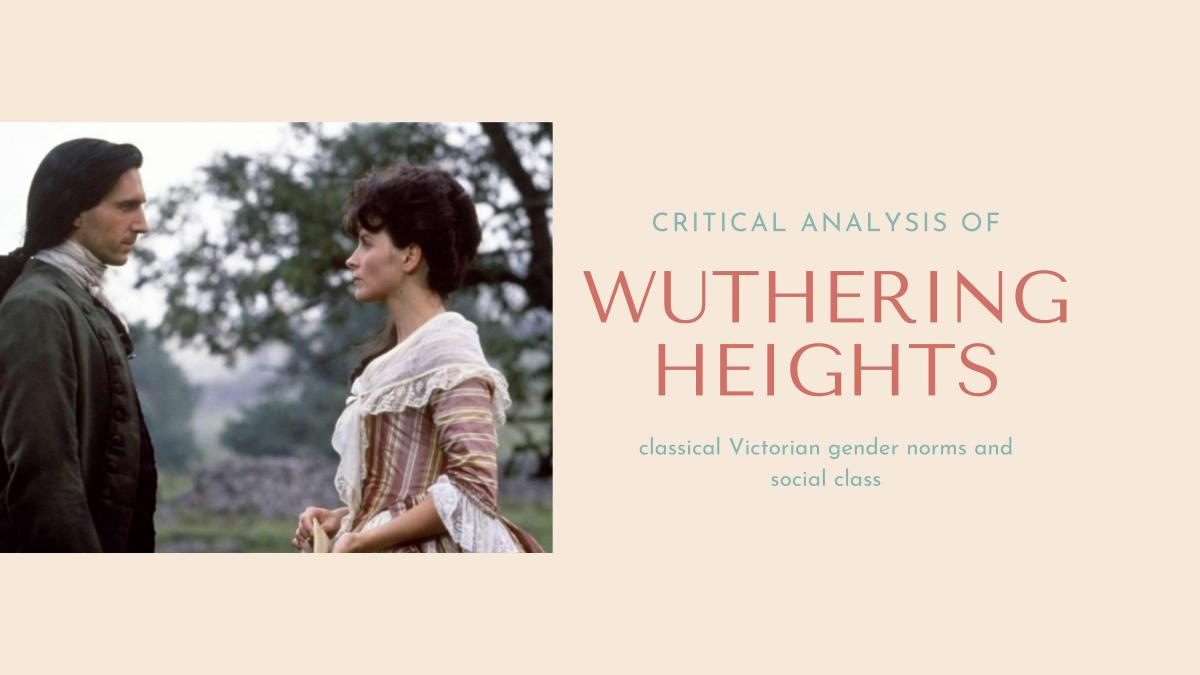
Top 10 Similar Topics
(Cerrito ) Wuthering Heights is acompelling work that shows the direct effect of selfishness on happiness. Selfishnessdirectly effects happiness in that an increase in selfishness leads to torment, while adecrease in it leads to happiness and peace. Fulfilling your desires at the cost of others leads to torment and a lack ofhappiness Emily Bronte’s Wuthering Heights is a perfect parallel to the time in which it was composed. Heathcliff, her protagonist turned antagonist, was brought into a world in which he did not belong, in both a social and economic sense. As he joined the life of Wuthering Heights The New Gnosticism: The Complex Dichotomy in Wuthering Heights Theme Of Psychoanism In Wuthering Heights Wuthering Heights, published by Emily Brontë in , tells a story of the history of Wuthering Heights and the tragic love story that precedes it. The two central settings of the work, Thrushcross Grange, and Wuthering Heights represent Freud’s structural model of the human psyche: the id and the superego

✒️ Wuthering Heights: Essay Samples
Emily Bronte’s Wuthering Heights is a perfect parallel to the time in which it was composed. Heathcliff, her protagonist turned antagonist, was brought into a world in which he did not belong, in both a social and economic sense. As he joined the life of Wuthering Heights The New Gnosticism: The Complex Dichotomy in Wuthering Heights (Cerrito ) Wuthering Heights is acompelling work that shows the direct effect of selfishness on happiness. Selfishnessdirectly effects happiness in that an increase in selfishness leads to torment, while adecrease in it leads to happiness and peace. Fulfilling your desires at the cost of others leads to torment and a lack ofhappiness Here is a list of the most popular essay topics on Wuthering Heights: Polar Opposites in Wuthering Heights How Emily Bronte uses the first 3 chapters of Wuthering Heights to create foreboding Othello vs Wuthering Heights The use of setting in Wuthering Heights Discuss the importance of setting in “Wuthering Heights”

Improving writing skills since 2002
Emily Bronte’s Wuthering Heights is a perfect parallel to the time in which it was composed. Heathcliff, her protagonist turned antagonist, was brought into a world in which he did not belong, in both a social and economic sense. As he joined the life of Wuthering Heights The New Gnosticism: The Complex Dichotomy in Wuthering Heights Modern critics have also had much to say about Wuthering heights, finding the structure to be a "complex collage" as well as "too complex" because of the constant alterations in narration. According to an unsigned American review published in , Bronte's selection in language is characterised by " Savageness and roughness."4,5/5(2) Theme Of Psychoanism In Wuthering Heights Wuthering Heights, published by Emily Brontë in , tells a story of the history of Wuthering Heights and the tragic love story that precedes it. The two central settings of the work, Thrushcross Grange, and Wuthering Heights represent Freud’s structural model of the human psyche: the id and the superego

Categories
(Cerrito ) Wuthering Heights is acompelling work that shows the direct effect of selfishness on happiness. Selfishnessdirectly effects happiness in that an increase in selfishness leads to torment, while adecrease in it leads to happiness and peace. Fulfilling your desires at the cost of others leads to torment and a lack ofhappiness Emily Bronte’s Wuthering Heights is a perfect parallel to the time in which it was composed. Heathcliff, her protagonist turned antagonist, was brought into a world in which he did not belong, in both a social and economic sense. As he joined the life of Wuthering Heights The New Gnosticism: The Complex Dichotomy in Wuthering Heights Wuthering Heights has proven to be much more than just a silly love story about characters, who, in the end objectify no real thought or emotion from the reader. It appears to be better accepted as a window into the human soul, where one sees the loss, suffering, self discovery, and triumph of the characters in this blogger.comted Reading Time: 7 mins
Wuthering Heights Essays
Emily Bronte’s Wuthering Heights is a perfect parallel to the time in which it was composed. Heathcliff, her protagonist turned antagonist, was brought into a world in which he did not belong, in both a social and economic sense. As he joined the life of Wuthering Heights The New Gnosticism: The Complex Dichotomy in Wuthering Heights Theme Of Psychoanism In Wuthering Heights Wuthering Heights, published by Emily Brontë in , tells a story of the history of Wuthering Heights and the tragic love story that precedes it. The two central settings of the work, Thrushcross Grange, and Wuthering Heights represent Freud’s structural model of the human psyche: the id and the superego Wuthering Heights is a timeless classic in which Emily Brontë presents two opposite settings. Wuthering Heights and its occupants are wild, passionate, and strong while Thrushcross Grange and its inhabitants are calm and refined, and these two Mirrors, Windows, and Glass in Wuthering Heights Robert Klein Wuthering Heights
No comments:
Post a Comment